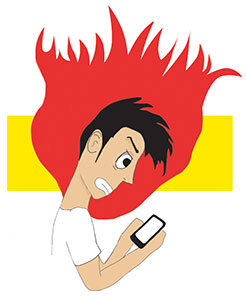Disconnect, you’ll be happier

Put down the phone!
A new semester, difficult classes, or the balancing game between work and school might find you struggling to find free time, social life and dealing with a lot of stress.
Research conducted by Kent State faculty members shows something else might be adding to your daily stress levels: your cellphone.
Andrew Lepp, Jacob Barkley and Aryn Karpinski in the College of Education, Health and Human Services released their study at the end of last year. The core of their research showed that high cellphone use tied to higher anxiety levels, lower GPAs and lower happiness levels, as demonstrated in their survey sample of 500 students.
Lepp, who has taught at Kent State for 10 years, said the research began as a personal interest of his. He noticed cellphones kept popping up in the classroom, and he wondered if there was a connection between student performance and cellphone usage.
“The students who would have difficulty putting [their phone] away in the classroom tended to do worse on tests, but that was just an observation,” Lepp said. “I didn’t have any actual research.”
So Lepp collaborated with Barkley, who he had previously worked with on a similar study. The two earlier linked cellphone use and cardiovascular health. That initial study was when the two heard students begin to identify cellphone use as a stressor in their daily lives.
“We asked all of the students, ‘how does a cellphone make you feel? How do you feel at the end of the day when you’ve used your cellphone all day?’ And most students said, ‘We feel stressed’,” he said. “So that was something we wanted to follow up on.”
Junior psychology major Chloe Kuncel said not having her phone makes her feel anxious, echoing the students in the survey.
“I feel like I’m going to miss something,” she said. Kuncel said she tends to keep her phone in her bag during class and away from her while she studies. However, the idea that social media goes on without her drives home the feeling of anxiety.
“I think having a cellphone and quick and easy access to social media makes people feel anxious,” she said, “because they are so quick to judge and compare their lives to everyone else’s.”
Lepp said this fear of missing out, especially with the explosion of social media networks, is an important part of our connection to cellphones and part of what distracts us so regularly during the day. Whether it’s texting a friend or telling your social networks what you’re up to, the need to stay in constant contact keeps students glued to their phones.
Plus, detached communication can add to our stress levels. With texting, as Lepp said, there’s no chance to read body language or fully understand what the other person means by his or her message. It can therefore be confusing and stressful.
Kuncel said this was something she saw reflected day-to-day, with people becoming less outwardly social and more focused on their phones.
“People are too worried about their phones rather than being present wherever they are and with whatever they are doing,” she said. “People use less eye contact because they forget how to communicate with people face-to-face.”
Lepp says the best remedy for all of these problems is to remember to detach from the cellphone for even an hour a day and to make sure our communication with others can still occur in person.
“Let’s not forget face-to-face communication and those things that are important,” he said. “We need to show in the old-fashioned way how important people are to us, rather than relying on these devices to get through to our communication.”
Detaching from cellphones for longer periods of time also will help to improve our quality of life, which was another aspect of the research. Students who used their cellphones less regularly were happier and had higher GPAs. And, while Lepp said this is only a relationship and not yet a case of causality, he and the other researchers have plans to continue exploring the topic.
In the meantime, Lepp emphasizes the idea that cellphones aren’t evil.
“We’re not trying to say the devices are bad, but you need to be conscious of your usage and when you’re using it,” he said.
Lepp believes that self-discipline is the key for anyone who finds themselves constantly on their phone.
“Develop some self-discipline with your cellphone,” he said. “Put it in another room with the ringer on, so if someone’s trying to get a hold of you, you can hear. Don’t use it in class. If you’re able to focus on a task singularly, you’re going to do better with a single focus.”
Contact Katy Coduto at [email protected].

